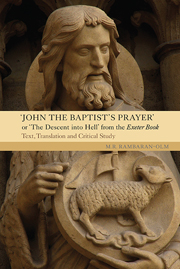 John the Baptist's Prayer 'The Descent into Hell' from the Exeter Book
John the Baptist's Prayer 'The Descent into Hell' from the Exeter Book Published online by Cambridge University Press: 05 August 2014
There seems nothing peculiar about an Anglo-Saxon poet writing about the theme of the descensus, since the motif was so popular during the period. Certainly narratives of the descensus could conjure up images of liberation, salvation and judgement, and in many instances within the corpus of Old English poetry, writers exercised literary passion to convey what was evidently a popular narrative. Most often, as this chapter examines, the descensus motif was employed to communicate the details of Christ's Passion, the salvation that comes through Him and His victory over Satan. This cosmic struggle between good and evil which had its roots in the Bible and Christian legend met its climax during retellings of the descensus; however, as one would expect a poem entitled Descent into Hell to conform to the typical Anglo-Saxon narratives of the Descent like so many other Old English texts, the poem's blatant deviation from tradition suggests that an objective other than the recitation of the descensus narrative is at its core.
JOHN THE BAPTIST'S PRAYER AND THE GOSPEL OF NICODEMUS
Before turning attention to Anglo-Saxon poetic comparisons, it would be useful to examine John the Baptist's Prayer in relation to the Anglo-Saxon version of the Gospel of Nicodemus. When comparing the two works, the dissimilarities are immediate. Whereas the Gospel of Nicodemus provides a full and detailed account of the evidence surrounding Christ's Descent, the 137 lines of John the Baptist's Prayer necessitate a limited selection of narrative details.
To save this book to your Kindle, first ensure no-reply@cambridge.org is added to your Approved Personal Document E-mail List under your Personal Document Settings on the Manage Your Content and Devices page of your Amazon account. Then enter the ‘name’ part of your Kindle email address below. Find out more about saving to your Kindle.
Note you can select to save to either the @free.kindle.com or @kindle.com variations. ‘@free.kindle.com’ emails are free but can only be saved to your device when it is connected to wi-fi. ‘@kindle.com’ emails can be delivered even when you are not connected to wi-fi, but note that service fees apply.
Find out more about the Kindle Personal Document Service.
To save content items to your account, please confirm that you agree to abide by our usage policies. If this is the first time you use this feature, you will be asked to authorise Cambridge Core to connect with your account. Find out more about saving content to Dropbox.
To save content items to your account, please confirm that you agree to abide by our usage policies. If this is the first time you use this feature, you will be asked to authorise Cambridge Core to connect with your account. Find out more about saving content to Google Drive.